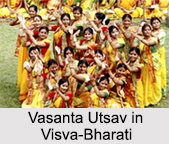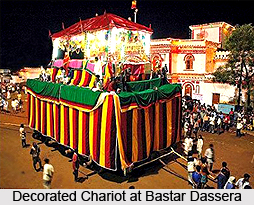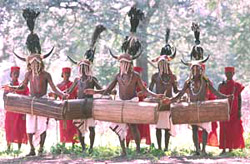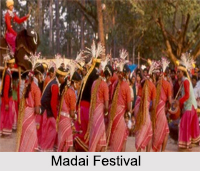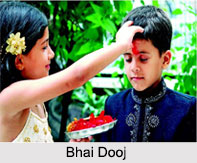 Bhai Dooj, also called Bhau Beej, Bhai Tika and Bhai Phonta, is a prominent Indian festival, celebrated by the Hindus of India, when sisters pray for a long and happy life for their brothers and perform the Tika ceremony. The celebrations and rituals of this day, similar to the festival of Raksha Bandhan, are performed on the last day of the 5-day long celebrations of the nationwide festival Diwali, referred to as Tihar in the states of Assam, Sikkim and Darjeeling in West Bengal, as well as in Nepal. Bhai Dooj falls on the second day of Shukla Paksha, the bright fortnight of the Hindu lunar month of Kartika.
Bhai Dooj, also called Bhau Beej, Bhai Tika and Bhai Phonta, is a prominent Indian festival, celebrated by the Hindus of India, when sisters pray for a long and happy life for their brothers and perform the Tika ceremony. The celebrations and rituals of this day, similar to the festival of Raksha Bandhan, are performed on the last day of the 5-day long celebrations of the nationwide festival Diwali, referred to as Tihar in the states of Assam, Sikkim and Darjeeling in West Bengal, as well as in Nepal. Bhai Dooj falls on the second day of Shukla Paksha, the bright fortnight of the Hindu lunar month of Kartika.
Regional Names of Bhai Dooj
Bhai Dooj is referred to in different names across different regions and communities. It is called "Bhai Tika" in Nepal and considered the second most important festival there after Dashain, which is what they refer Vijayadashmi or Dussehra. It is also known as "Bhaitihar", meaning Tihar of brothers and on this day, sisters pray to Yamraj for her brother`s long life and prosperity. They put a seven coloured long tika on the forehead of their brothers. It is called "Bhai Phonta" by the Bengali Hindu community and celebrated by them usually two or three days after Kali Puja celebrations. It is a public holiday in West Bengal. The festival is called "Bhai Bij" or "Bhau Beej" by the Gujarati, Marathi and Konkani-speaking communities in the western Indian states of Gujarat, Maharashtra, Goa and Karnataka. Other names given to the festival include "Bhatru Dviteeya" or "Bhatri Ditya".
Legends of Bhai Dooj
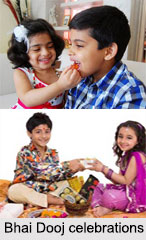 The festive day of Bhai Dooj is also given the name "Yamadwitheya" or "Yamadvitiya", associating with a legend that depicts the meeting between Yama, the god of Death and his sister Yamuna, the famous Indian River on Dwitheya, which is the second day after new moon. Another popular legend of Hindu mythology associated with this festival is about Lord Krishna, who after slaying the evil demon Narkasur, visited his sister Subhadra who gave him a warm welcome with sweets and flowers. She also affectionately applied "tilak" on Krishna`s forehead. Some believe this to be the origin of the festival, celebrated three days after Naraka Chaturdashi, which is celebrated on the second day of Diwali celebrations, in the belief that on this day the demon was defeated and vanquished by Krishna.
The festive day of Bhai Dooj is also given the name "Yamadwitheya" or "Yamadvitiya", associating with a legend that depicts the meeting between Yama, the god of Death and his sister Yamuna, the famous Indian River on Dwitheya, which is the second day after new moon. Another popular legend of Hindu mythology associated with this festival is about Lord Krishna, who after slaying the evil demon Narkasur, visited his sister Subhadra who gave him a warm welcome with sweets and flowers. She also affectionately applied "tilak" on Krishna`s forehead. Some believe this to be the origin of the festival, celebrated three days after Naraka Chaturdashi, which is celebrated on the second day of Diwali celebrations, in the belief that on this day the demon was defeated and vanquished by Krishna.
Celebrations and Rituals of Bhai Dooj
On the day of Bhai Dooj, sisters invite their brothers for a sumptuous meal often including their favourite dishes and sweets. The ceremony signifies the duty of a brother to protect his sister, as well as a sister`s blessings for her brother. Carrying forward the ceremony in traditional style, sisters perform Aarti for their brother and apply a red tika on the brother`s forehead. This Tika ceremony on the occasion of Bhai Dooj signifies the sister"s sincerest prayers for the long and happy life of her brother and in return, brothers bless their sisters and also treat them with gifts or cash.
As it is customary in Haryana and Maharashtra to celebrate the auspicious occasion of Bhai Dooj, women who do not have a brother worship the moon God instead. They apply Mehendi on themselves as their tradition. The sister whose brother lives far away from her and is unable to visit her at her home, sends her sincerest prayers for the long and happy life of her brother through the moon god. She performs Aarti for the moon. This is the reason why children of Hindu parents affectionately call the moon Chandamama. ("Chanda" means moon and "mama" refers to mother`s brother).
Bhai Phonta in West Bengal is celebrated with much splendour, marking many rituals along with a grand feast arranged for the brothers. The festival is also popular in Haryana, Gujarat, Maharashtra and Goa and celebrated with fervour and gaiety. Brothers and sisters look forward to the festive occasion with immense enthusiasm. It is a time of family reunions as all brothers and sisters in the family get together, with close relatives and friends also invited to celebrate the Bhau Beej in many families. Gifts are exchanged between brothers and sisters as a token of love and appreciation and special delicacies are prepared on the occasion, such as the Maharashtra sweet Basundi Poori or Kheerni Poori.
Related Articles:
Indian Religious Festivals
Hindu Festivals
Raksha Bandhan
Diwali
Paksha
Kali Puja
Naraka Chaturdashi

